As the most widespread minority of China, Hui Minority has its presence in 31 provinces, autonomous regions and municipalities directly under the Central Government. There are 1.8625 million Hui people in Ningxia Hui Autonomous Region, the main inhabited area of the ethnic group, accounting for 18.9% of the total population of Hui in China. The origin of Hui Minority can be traced back to Tang Dynasty (618-907A.D.). In the middle of the 7th century, a large number of Persian and Arab merchants came to coastal cities such as Guangzhou, Quanzhou and inland cities including Chang’an (present-day Xi’an) and Kaifeng in China by sea and land and settled down here. It is generally believed by historians that Hui Minority was formed in Ming Dynasty (1368-1644 A.D.). In the 13th century, the Mongolia army marched toward the west so people from the Western Regions moved to China in large numbers. As time went by, these people absorbed the national identity of Han, Mongolia, Uygur and others, forming a new nationality ---- Hui.
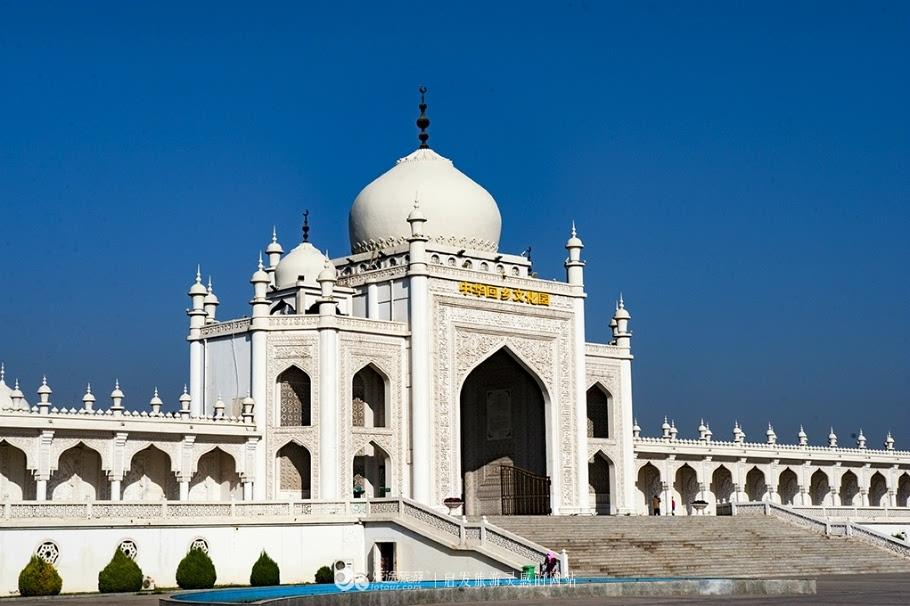
Hui is the abbreviation of Huihui. Huihui was originally called by others, but later the nationality also called itself Huihui. “Huihui”, first seen in Dream Pool Essays by Shen Kuo from the Northern Song Dynasty (960-1127 A.D.), referred to Huihe people (Huihu people) who lived in Anxi (present-day southern Xinjiang and some regions to the west of Cong Ling) since the Tang Dynasty. In the Southern Song Dynasty (1127-1279 A.D.), Huihui not only included Huihe and Huihu people mentioned in the Tang Dynasty but also some ethnic groups to the west of Cong Ling, which is different from what the connotation of Huihui now. At the beginning of the 13th century, many ethnic groups from Central Asia who believed in Mohammedanism, Persians and Arabs were sent to or voluntarily moved to China. They were Huihui people. These people were the main composition of Semu people and later they called themselves “Huihui”. Chinese historians tend to believe that “Huihui” is the result of the different writing or sound transformation of “Huihe”and “Huihu”. However, there is another version for the origin of Huihui in the folk. People from Persia and Central Asia in the Sui Dynasty and Tang Dynasty were regarded as Hu people. Some Hu merchants who chose to temporarily settled in China would migrate between their homes and China. They tended to go home before it became cold and came back in warm seasons. Therefore, Han called them “Hui” or “Huihui”.
The appellation of Hui may vary from different nationalities and dynasties. Hui ancestors were called “Sartqul” in Mongolia official files during Yuan and Song Dynasties. Musulman was transliterated to “Musuman” or “Musuluman”, same as the meaning of Chinese word for “Huihui” in Yuan Dynasty ruled by Mongolian. The word was also recorded in related dictionaries edited by people from Ming Dynasty. Nowadays, Hui is still called differently in various ethnic groups. Tibetans call Hui “Kace” for Hui people in Tibet may be from Kashmir. Mongols call the nationality “Hotun” because it is said that the local Hui people are from Hotan. However, the Kazak, Kirgiz and Uyghur in Xinjiang call them Tung’gen or Tung’gan. As there are many Ma families among Hui people, the Yi people in Sichuan regard them as Majia. Furthermore, the Wa and Dai ethnic groups in Yunnan call the Hui people Basi which means people from Persia. The different callings for Hui reflect the fact that the Hui people live together with many other nationalities and suggest the diversity of Hui’s origin and their characteristics of occupation and migration.
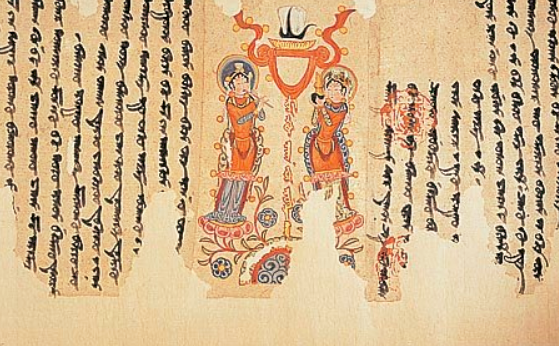
As one of the largest minorities in China, Hui Minority has a population of 10,586,087, according to the census data in 2010. Hui people mainly inhabit in Ningxia Hui Autonomous Region. In addition, they are many settlements in Xinjiang, Qinghai, Gansu, Shaanxi, Shanxi, Hebei, Tianjin, Beijing, Shanghai, Jiangsu, Yunnan, Henan, Shandong, Inner Mongolia, Liaoning, Jilin, and Heilongjiang. In terms of the east, middle and west of China, the population of Hui is the largest in the west, accounting for 60.75% of the total. According to the division of northern and southern China, Hui nationality is mainly distributed in northern provinces and regions of China. Hui people live together with Han in the hinterland of China while Hui people mainly live with local minorities in the border regions. As most of their settlements are located along the transport lines, their economy and culture are relatively developed.
Current Hui people speak Chinese. When Hui ancestors moved east, they used Arabic, Farsi and Chinese at same time. As they lived together with Han people for a long time, they used to using Chinese as the common language of their own nationality while there were some phrases and words borrowed from Arabic and Farsi in their language. With many years’ development, Chinese was identified as the common language of Hui Minority in the Ming Dynasty. In the middle of Ming Dynasty, with the rise of Mosque Education, which is a traditional Islamic education system in China, Scholastic Language and Xiao’erjin appeared.
As a special language used by Mosque Education, Scholastic Language is produced by transliterating Arabic or Farsi in Chinese or paraphrasing Arabic or Farsi in Chinese words or phrases. The transliteration or paraphrase absorbed and reformed the parts of classical and folk terms in the languages of Confucianism, Taoism and Buddhism in China. Xiao’erjin is a alphabetic writing created by Islamic classics teachers according to the specific conditions in China. It is spelled in Chinese with Arabic letters and contains Arabic Persian vocabularies, with occasional Chinese characters. The character is not only used for writing classics, but communication including correspondence and recording.
By the way, Hui people who live together with other minorities may use other nationalities’ characters and languages and are influenced by their cultures.
As Hui people are distributed widely across the nation, their eating habits are different according to the places they live. Hui people in Ningxia prefer flour-made dishes. Hui people who live in town are used to drinking milk tea for breakfast around the year. They mainly eat beef, mutton and sometimes camel meat, and also eat various fishes. Speaking of beef and mutton, the shredded cakes in mutton and beef soup is one of their favourite dishes. They often eat them for breakfasts or sometimes lunches. For those Hui people who live together with other nationalities, their eating habits are influenced by local people to some extent. For example, the main dishes for those Hui people living in Tibet are butter tea and tsamba, which is same with the local Tibetan.
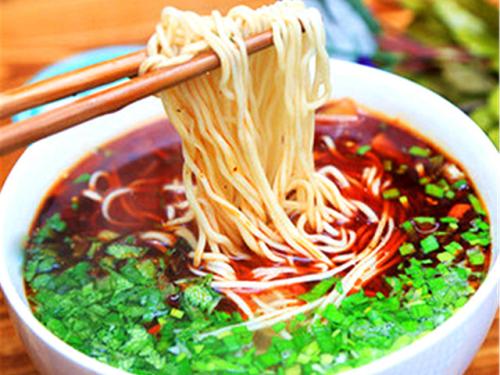
In addition, Hui people are forbidden to eat pork, dogs, horses, donkeys, mules and other animals who are not ruminants and the blood of all animals and birds for they are not clean and pure in their belief of Islam. As mentioned above, they prefer beef and mutton. Mutton Eaten with Hands and Braised Goat Knuckle are the unique dishes from Hui. Flour-made food is a staple in Hui’ diets. They often cook Sanzi, a deep-fried dough twist, and Youxiang, cake of flour with salt fried in sesame oil, when they receive guests, hold wedding feasts or celebrate major festivals. There is another famous flour-made food called Lanzhou Noddles. A classic bowl of the stretched noodles comes with beef broth, slices of beef, coriander and spring onions. After eating, the good taste will still linger in your mouth, making it impossible for you to forget.
Tea is the Hui people’s favorite traditional drink. They also serve their guests with tea. As Hui is distributed widely across China, they have different habits of drinking tea. Hui people in the northern China tend to drink tea boiled in the jar; Hui people in Yunnan Province like drinking baked tea; Those people in Hunan Province prefer grinding tea. It is a unique habit for Hui people in the northwest of China to drink Covered-bowel Tea. There are usually tea, rock sugar, medlar, walnut kernels, sesames, red jujubes, dried longan and raisin (or dried apple) in the tea bowel. Besides, Hui people also have assorted Chinese herbal tea.
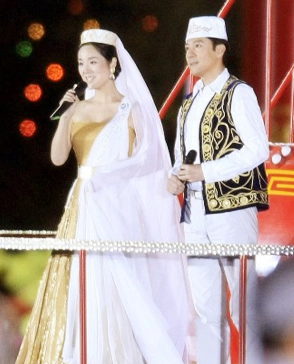
The symbol of Hui Minority’s clothes reflects in the head. Men from Hui Minority prefer wearing white round caps without brim. There are two types of round caps, including the flat-topped ones and hexagonal-topped ones. Those caps are mostly white, gray, blue, green and black. Normally, they prefer white caps in summer while like wearing deep colors, such as gray or black, in cold seasons. In addition, imams in mosques and elders with profound beliefs prefer turbans. It is a typical character of Hui women to wear head covers. In light of the tradition, the aged women wear white covers, making them look graceful; The middle-aged women tend to wear black covers for this color makes them grave and elegant; Unmarried women should wear the green to show their freshness and prettiness. As for the length, married women and girls’ covers are usually shorter than the aged people’s.
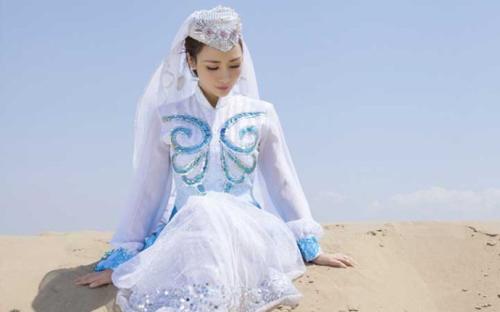
Most of Hui girls have their ears pierced since they are very young and wear earrings when they turn seven or eight years. In addition, Hui women are fond of wearing rings and bracelets. There is a story about their interest for bracelets. It is said that long long ago, a Hui wife was supporting her mother-in-law by her own. As her family was so poor that they had no enough foods, she went to a merchant's house to do temporary work of cooking. After kneading dough, the wife would not wash her hands for she wanted to save the flour on her hands for the elder in her family. After a while, since she did such a thing, clouds began to fill the sky with lightning flashing and thunder roaring suddenly on a day. They were all afraid of being punished by gods for the indecent thing they did. Therefore, the wife stretched out her hands and let the lightning struck them. According to Chinese belief in gods, this way can make gods forgive the mistake the ordinary people made. To the wife’s surprise, however, she got two gold bracelets on her each hand after the lightning. Therefore, wearing bracelets became a symbol of caring for their parents and their parents-in-law. Otherwise they also like dotting a red spot on their foreheads and painting their nails.
The wedding day for Hui youth is generally designated on Friday because Hui people regard this day as an auspicious day traditionally. According to their regulations, their wedding shall not be held during Ramadan. In terms of the intermarriage scope, men from Hui Minority can marry women from other nationalities while Hui women can not marry men from other nationalities generally.
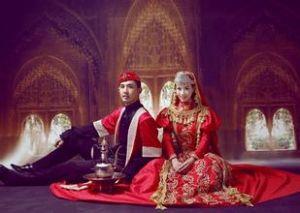
There are several procedures for traditional Hui weddings. When a young man finds the one he loved, he will tell his parents about this. Then a well-respected elder will be invited as the intermediary in the family to ask the girl whether she agrees to marry this young man. If she says yes, then the two families will prepare the engagement ceremony, which Hui call “Dingcha”. The family of the young men will visit his loved lady’s family with famous and high-quality tea and several suits of dresses for the lady. The lady’s family will treat them a feast where their friends and relatives are the witnesses of their engagement. By holding the ceremony, the two young persons show their determination to their marriage. Since their determination has been shown, the family of the young men will purchase articles of daily use and several pieces of jewelry such as bracelets, earrings, and rings. With these betrothal gifts, the young man accompanied by his parents and aunties to visit the woman. By this visit, the marriage is officially determined and the two families begin to discuss the wedding date.
Then the big day, wedding day comes. The wedding ceremony is held by an imam. The unique part is that the imam will read related episodes of Koran in front of the couple for teaching them how to be married people. Then the imam announces them as husband and wife. After the ceremony, the banquet for guests begins. Generally, in the afternoon or the next day of the wedding day, the newly wife presents shoes she made for her parents-in-laws, clothes for her husband, and embroidered pillowcases and purses to the public for appreciating. Then a quick-witted and eloquent person is chosen to make up impromptu speech for boasting and praising how smart and capable a person the bride is.
After three or seven days of the wedding, the groom should accompany the bride to her home with gifts. Meanwhile, his parents-in-law should prepare in advance to entertain their son-in-law and daughter. After this, the wedding is literally finished.

As the word “death” is forbidden in Hui, they call “death” “Wuchang”. Hui people regard the death of believers, professionals and religious elites as “Guizhen”. According to Islam, the dead must be buried within three days after the death while the funeral shall be conducted in the principle of frugality.
The funeral generally includes several procedures. First, when a person stops breathing, the family or an imam besides should make the dead’s eyes and mouth closed, fix the hair, and cover the body with a clean white cloth with limbs getting right. Then the dead should be placed in a spacious and ventilated place. Second, the dead’s family will prepare shrouds including white clothes and caps for the dead. Third, three persons will be appointed to wash the body for the dead, wear shrouds and tighten the dead’s waist with a white cloth band. Fourth, the dead will be placed in a large wooden casket. The people attending the funeral are required to bathe and wear clean clothes. These people show their respect and farewells to the dead. After that, the dead will be buried in the ground within three days of death according to their customs. Lastly, the dead is buried into an arched tomb.
As Hui believes in Islam, Lesser Bairam, Corban Festival and Maulid Al-Nabi are the three top festivals and celebrated according to the Islamic calendar.
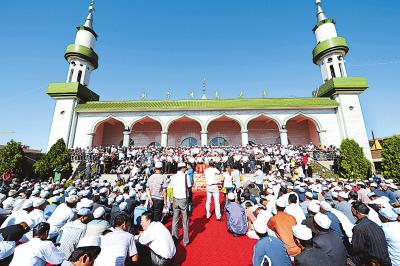
Ramadan is on the ninth month of Islamic calendar. During Ramadan, all men over 12 years old and women more than 9 years old should take part in fasting. Why do Muslims of Hui Minority fast? According to Koran, when the Prophet Muhammad was 40 years old (the ninth month of the Islamic calendar), Allah began to impart him the message of the Koran. Therefore, Hui regard Ramadan as the most honorable, auspicious and happiest month. To celebrate the historical moment, Muslims fast for a month during Ramadan. The starting and ending dates of Ramadan depend mainly on when the new moon emerges.
During Ramadan, Hui people who are experiencing fasting are forbidden to eat food in the daytime and they are only allowed to eat foods and drink water by night. In addition, those people can’t have sex during this month. The purpose of fasting is to make people suffer from hunger and thirst and make the rich feel the pain of being poor, thus helping Hui Muslims develop the virtues of fortitude, integrity, and being strong.
When the fasting is over, Lesser Bairam, the most important festival for Hui, begins. Lesser Bairam lasts for three days. On the first day, Hui people wake up early and begin to clean their yards and alleys. All people bathe and put on their new clothes, and then go to mosques. During the festival, every family will make Sanzi, Youxiang and other traditional snacks. Meanwhile, Hui people will prepare excellent cuisines with the character of Hui Minority and give them to their friends, relatives and neighbors with their greetings.
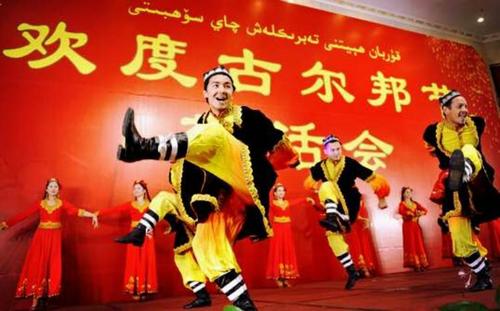
Corban Festival is usually celebrated after 70 days of Lesser Bairam. There is a story about the origin of Corban. When Mahdi Ibrahim was still an ordinary person, he had no sons at his old age, thus he prayed Allah to give him a son. Soon after, Ibrahim did have a son. With gratitude to Allah, he raised his son with care. A decade and several years later, Ibrahim had a dream where Allah ordered him to sacrifice his beloved son so as to test his honesty. Without any doubt, Ibrahim decided to sacrifice his son while his son, who totally understood his father’s decision, also encouraged him to do so. When Ibrahim finally made up his mind to kill his son, Allah ordered an al-Malaikah to replace his son with a sheep as the sacrifice. Therefore, since Ibrahim was regarded as the Ancestor, the day when Ibrahim was tested for his honesty has been memorized and celebrated as a traditional festival.
On this big day, Muslims from Hui Minority will gather together at mosques or public places and hold a grand ceremony. In addition, Muslims will prepare animals including camels, cows and sheep to sacrifice. These animals should be healthy without any disabilities. The meat attained should be divided into three portions. One portion is for personal use, one for relatives and friends as the gift, and the rest for the poor.
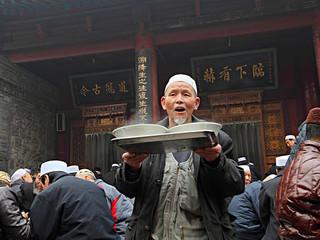
Maulid Al-Nabi is a festival in memory of the birth and death of Mohammed. It is said that his birth and death are on the same day of the 12th day of the third month according to Islamic calendar. On this day, Muslims gather together at mosques to chant and remember the Prophet. In addition, it is also a day for Muslims to confess their sins. After these activities, the banquet begins. As for the preparations of the banquet, Muslims voluntarily donate flour, cooking oil, beef, mutton and money. Some volunteers are assigned to purchase and prepare materials, make traditional Hui snacks, and cook meat and dishes. As the day is a sacred date, their efforts are regarded as doing good.